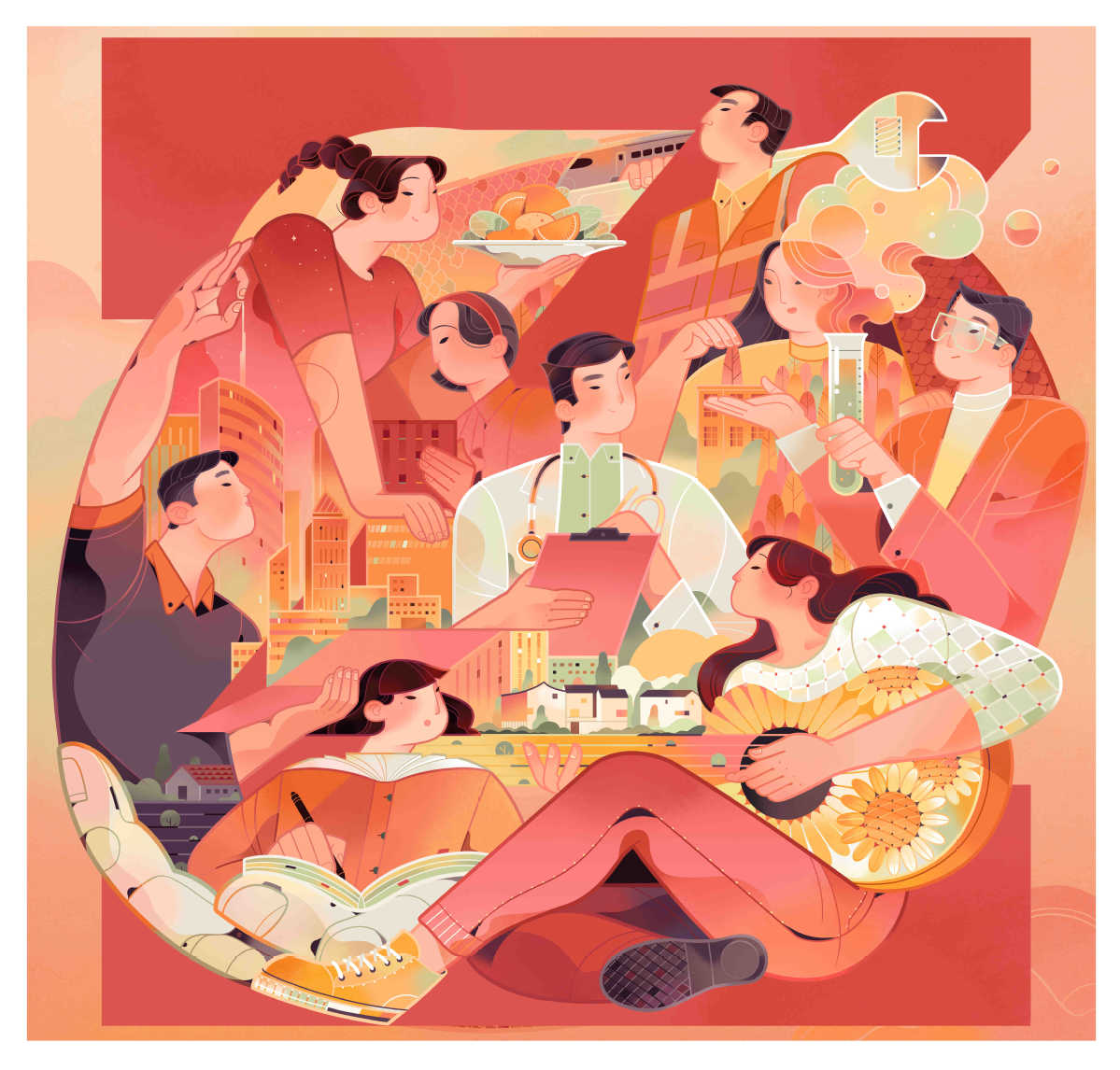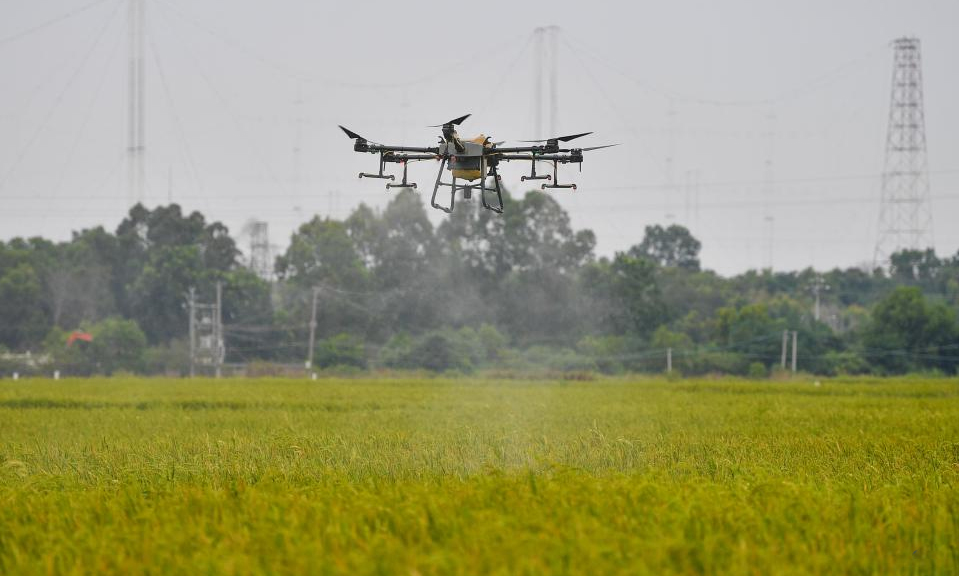Young people pay tribute to nation's advances

SONG CHEN/CHINA DAILY
Work of the Party makes strong impression
From a very young age, Dylan Austin Walker, 26, who was born and raised in the United States, showed an interest in learning about the Chinese language, the history of Chinese revolution, and the Communist Party of China.
During his first trip to China in 2012, when he was 16, Walker bought a copy of Quotations from Chairman Mao Zedong, and was particularly impressed by the CPC's principle of always working for the people and putting the majority of the people's interests ahead of those of oneself.
"I wanted to be a part of this, to be part of something bigger than just our individual self," Walker said in an interview with 21st Century newspaper, which is affiliated with China Daily.
So, two years later, on the day after his 18th birthday, Walker applied to join the Communist Party of the US. "No matter what country we're from, no matter what our skin color is, we're all part of one big revolutionary family," he said.
But it was not until 2016, when he traveled to China again and stayed for the following six years, that Walker witnessed how the CPC works for the well-being of the people.
"When you look at poverty alleviation, the digital economy, infrastructure — so many aspects in life and the development of society are all due to the leadership of the CPC. Without the Party governing, none of this can happen," Walker said.
He is particularly impressed by the CPC's determination to fight corruption and bring down corrupt officials, no matter how high they rank. As long as it is found that they are corrupt, they will all be removed from their positions.
"This is something we don't see in many Western countries, where institutional corruption is almost legalized and given a free pass," he said.
Walker also noticed that the CPC is not only fighting to give the Chinese people a better life, but also helping people from other parts of the world to benefit from China's development. The evidence for this lies in the nation's framework for the Belt and Road Initiative and the vision of building a community with a shared future for mankind, with a lot of work already completed to carry out these blueprints.
"This is something special we can see with the CPC. It practices what it preaches. What it says, it will do," Walker said.
Now that the 20th National Congress of the CPC has been held, Walker said he is proud that, as an international student, he has experienced China's development in the past six years and will continue to witness it for the foreseeable future. "I'm very much looking forward to being part of the construction of this country and to putting myself into the construction of Chinese socialism," he said.
He also encourages his friends in the US to do the same by coming to China to study, to work, or even just to travel, so that they can see the nation with their own eyes. But Walker has one tip to offer — they should come with an open mind.
"Don't come here with your mind made up that it's this way, it's that way, it's bad. Leave all that out — as if your mind is a blank piece of paper. Leave your misconceptions behind so you can truly understand," he said.
River doctor
The Lancang, a river that originates in Qinghai-Tibet Plateau, flows through Yunnan province in Southwest China, but once it crosses the border with Myanmar and flows south, its name changes to the Mekong. It is the main waterway in Southeast Asia, but also home to the notorious Golden Triangle — an area on the borders of Laos, Myanmar and Thailand long plagued by drug problems.
Guo Wei, 29, a member of the CPC and the Yunnan Provincial Public Security Bureau's water patrol team, has spent time working as a police doctor on the river.
Since joining the team in 2017, Guo has taken part in dozens of missions along the river, as patrolling the Mekong can be extremely dangerous, and a doctor's presence is always required.
For his first mission, he was stationed for four months at a site close to the Golden Triangle. He was initially excited, as to him the term "Golden Triangle" used only to exist in movies.
"It was not until I heard gunshots being fired at night from the Myanmar side of the border that I literally realized what the Mekong River really means," Guo told Twenty, the latest micro documentary series produced by 21st Century newspaper.
It may appear difficult to be a police officer and a doctor at the same time, but Guo does not view the two roles as contradictory, but as allowing him to do his job better.
As a police officer, he and his team work with local government military forces in Laos, Myanmar and Thailand, ending the operations of many drug-related local armed forces, and creating a safer and more stable environment for local people.
In addition to carrying out his duties as the team's doctor, Guo has acted as a volunteer medic for residents in villages along the river, where there is a serious lack of medical infrastructure and healthcare facilities. He said the residents really look forward to seeing him and his team, who can help solve many health problems by offering free medical consultations and free medicine.
"By doing this work, I feel as though I am physically part of the Belt and Road Initiative, helping to push it forward," said Guo, who considers himself an "active connection" between China and neighboring countries in Southeast Asia.
This is why he was happy to see the 20th National Congress of the CPC held successfully, because it set goals and laid out paths for the nation and the Party for the following five years, or even beyond.
"The Party and our country have painted the big picture, so our mission is to be more grounded — to follow that direction, to forge ahead, and to do our daily jobs well," Guo said.
Quick to volunteer
In China, older people sometimes use the term "flowers in a greenhouse" to refer to the younger generation, as they feel that young people are spoiled and lack toughness to endure hardships. But the experience of Ding Ruixin, a 24-year-old doctor from China-Japan Friendship Hospital in Beijing, proved otherwise.
In March, COVID-19 cases surged in Changchun, capital of Jilin province. When hospitals in Beijing started assembling a medical team to help Changchun, Ding volunteered without hesitation, as she is from Heilongjiang province, which neighbors Jilin, and also because she is a member of the CPC.
Ding said that about half the doctors in the 30-member team she joined are Party members. She had much to learn from the senior members, who showed great professional skill in doing their work and always volunteered to take on difficult tasks. They were also willing to teach young doctors everything they knew.
"Their dedication to work, and their spirit of 'passing down the torch', not only impressed young Party members such as myself, but also everyone else," said Ding, adding that after the team returned to Beijing one month later, 10 of its young members applied to join the Party.
For Ding, the "torch" was initially passed down to her in her family. Her grandfather and an uncle are both Party members. Ding said that many years ago, her grandfather was given a special mission to help in a disaster area. At the time, even though she was very young, Ding somehow felt a strong sense of responsibility.
"A group of people who may not have known each other were contributing their unified efforts bit by bit for the same great cause. I wanted to be like them," Ding told the Twenty micro documentary series.
She joined the CPC in college, and this year — just two years after she graduated and started working as a doctor — Ding, just like her grandfather, went to aid a disaster area.
Ding said the happiest time for the team during the month she volunteered in Changchun was when the number of confirmed COVID-19 cases in the city fell from four digits to three. Seeing these numbers dropping, Ding really appreciated her work, because she and her colleagues were making a difference.
"Even though we did not see much of the city, we could sense that it was healing day by day. We 'flowers in a greenhouse' can be superheroes, too. We're capable of protecting a group of people, a city and a country," Ding said.
Returning from this mission gave Ding a new understanding of her job and her role as a CPC member, especially now that the 20th National Congress of the Party has just been held.
"As a young member, I will be more active in giving back to the Party and the masses," Ding said. "And as a young person, I would like to urge the younger generation not to forget its original aspiration to forge ahead to realize its dreams."
Surprising discovery
Shamim Zakaria, 28, still finds it funny recalling the first time he traveled to China five years ago, when he didn't bring his camera because he thought photography was prohibited. The Indian journalist was embarrassed by this experience, as he could not believe he knew so little about his country's "next door neighbor".
But his lack of knowledge was probably due to the limited number of sources for outsiders to learn about China.
"Whatever information we get about China is mainly through the perspective of Western media — and sometimes it's not unbiased," Zakaria said in an interview with 21st Century newspaper.
The fact that photography is allowed in China was not the only surprising discovery that Zakaria made after he arrived in the country.
A friend once invited him to visit a remote mountainous village. Zakaria started to picture himself being stuck in the middle of nowhere, with no roads or phone signals to connect him to the outside world. But he was wrong again — not only was the village fully equipped with infrastructure, it boasted a high-speed internet service. What was more surprising to Zakaria was that even the village's elderly residents knew how to use a smartphone.
"When we talk about China, we mainly think about first-tier cities such as Beijing, Shanghai and Shenzhen, but China goes much beyond that. If you want to experience the real China, explore the countryside and remote areas," Zakaria said.
He later learned that even the remotest areas of China are well developed due to the CPC's people-centered development philosophy, which means the government gives equal importance to every sector of society, and no one is left behind.
The latest example of this philosophy is the efforts made by China to alleviate poverty. Last year, the nation declared the elimination of absolute poverty, having lifted nearly 100 million people in rural areas out of poverty over the past eight years.
Zakaria is impressed by this achievement. "A lot of good policies can be made on paper, but what really matters is how they are implemented on the ground and at grassroots level," he said.
Poverty and inequality are problems long fought by many countries, but few of them have gone as far in this regard as China, which Zakaria said has set an example for the rest of the world.
"If China, a country with 1.4 billion people, can vanquish absolute poverty, it shows that if a nation has a capable leadership, if it has resilience, and if it has the determination to do a task, it can definitely do it," he said.
Zakaria, who has now lived in China for five years, has never regretted his decision to move to the nation. This is why he recommends that people curious about China should visit the country "to experience its amazing people and culture".
"Maybe some of the problems in their own countries can be solved through Chinese wisdom and experience," he said.
Photos
Related Stories
Copyright © 2022 People's Daily Online. All Rights Reserved.









